When it comes to heating water in your home, many people are switching to tankless electric water heaters for their efficiency, space-saving design, and cost savings. But with so many options available, how do you choose the right one for your needs? In this guide, we’ll walk you through the important factors to consider when selecting a tankless electric water heater, answer common questions, and help you find the best option to fit your household.
Why Choose a Tankless Electric Water Heater?
Unlike traditional water heaters that store water in a tank and continuously heat it, tankless electric water heaters provide hot water on demand. This means they only heat water when you need it, which can lead to significant energy savings over time. Here are some key reasons to consider a tankless model:
- Energy Efficiency: Since water is heated only when required, tankless electric water heaters use less energy compared to traditional models with tanks.
- Space Saving: Without the need for a bulky water tank, these heaters take up less space, making them perfect for smaller homes or apartments.
- Cost Savings: While the upfront cost might be higher, the energy savings over time can offset the initial investment.
- Endless Hot Water: With a properly sized unit, you’ll never run out of hot water, even during peak usage.
Factors to Consider When Choosing a Tankless Electric Water Heater
Before diving into specific product recommendations, it’s important to understand the features and factors you should consider making an informed choice.
1. Water Usage and Flow Rate
The most important factor to consider is the flow rate, measured in gallons per minute (GPM). A tankless electric water heater needs to be powerful enough to provide hot water for all your appliances and fixtures simultaneously.
For example:
- A sink uses about 0.5-1 GPM.
- A shower typically uses around 2-2.5 GPM.
If you plan to use multiple outlets at the same time, you’ll need a unit with a higher GPM to meet demand.
2. Power Output
The power output, measured in kilowatts (kW), determines how quickly the unit can heat water. Larger households or homes in colder climates may require a heater with a higher kW rating to ensure water is heated to the desired temperature.
3. Installation and Space
One of the main benefits of a tankless electric water heater is its compact design. However, you should still consider where you’ll install the unit and ensure there’s enough space for proper ventilation and electrical connections.
4. Energy Efficiency Rating
Look for models with a high energy efficiency rating. Some units are ENERGY STAR certified, which guarantees that they meet strict energy efficiency guidelines.
5. Maintenance and Durability
Most tankless electric water heaters require little maintenance, but it’s important to choose a model with a durable build and long warranty. Some models also include features like self-cleaning technology, which can help extend the lifespan of the unit.
Top 5 Tankless Electric Water Heaters for Your Home
Below are some top-performing tankless electric water heaters that cater to different household needs, providing efficiency and reliability. Each model offers something unique, so you can find the right match for your home.
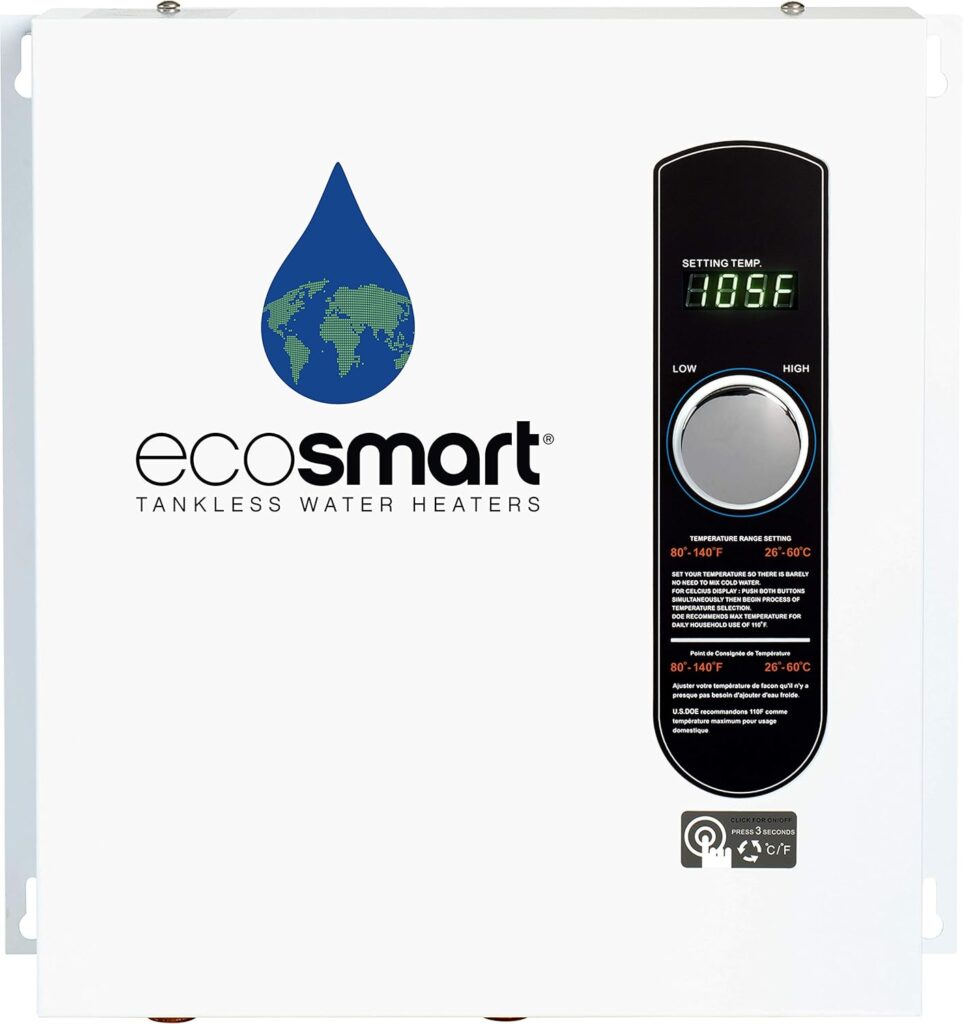
1. EcoSmart ECO 27 Electric Tankless Water Heater
Why It’s Great: The EcoSmart ECO 27 is perfect for homes in colder regions that require consistent hot water. Its advanced technology adjusts energy output to ensure efficiency.
- Flow Rate: 6.5 GPM
- Power Output: 27 kW
- Key Features:
- Self-modulating technology to save energy
- Ideal for larger households
- Compact and easy to install
- Pros:
- Great for colder climates
- Energy-saving design
- Cons:
- Requires a high electrical load
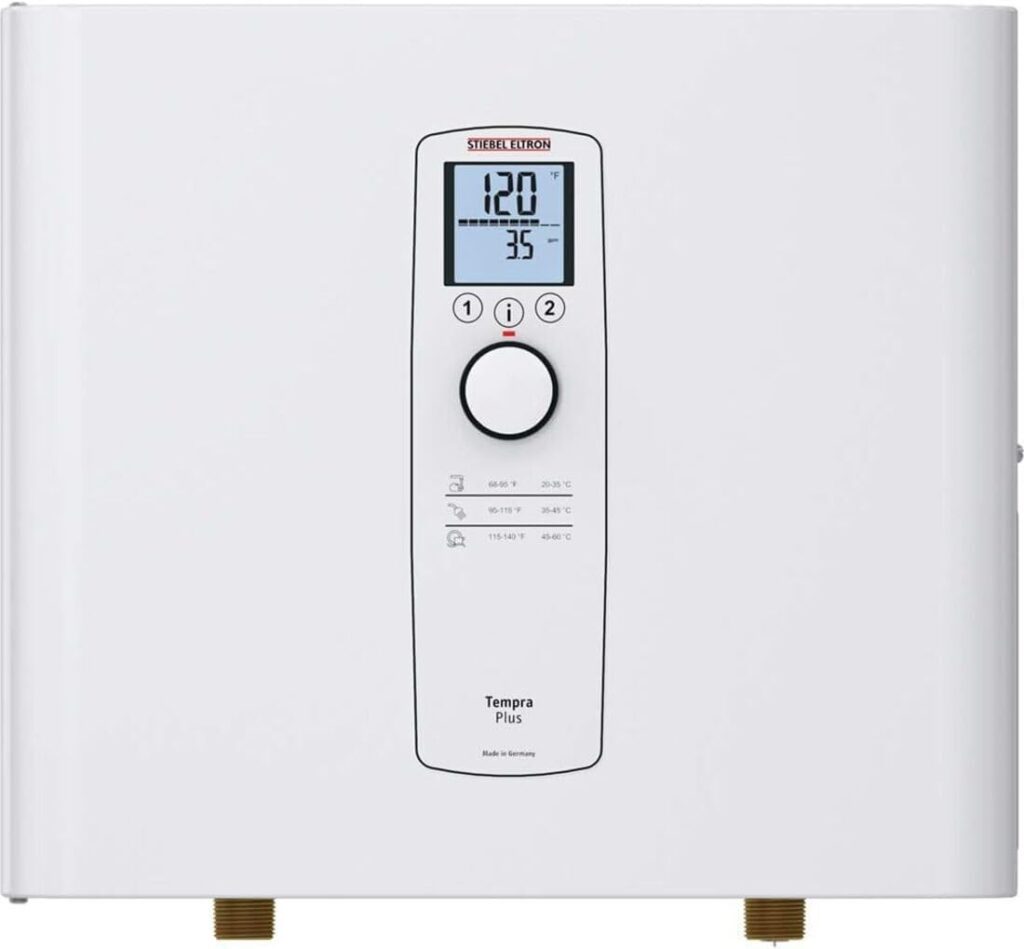
2. Stiebel Eltron Tempra 24 Plus
Why It’s Great: Known for its quiet operation and precise temperature control, this model is perfect for homeowners who value comfort and reliability.
- Flow Rate: 4.0 GPM
- Power Output: 24 kW
- Key Features:
- Advanced flow control for stable water temperature
- Digital temperature display
- Silent operation
- Pros:
- Reliable temperature regulation
- Easy installation
- Cons:
- High initial cost
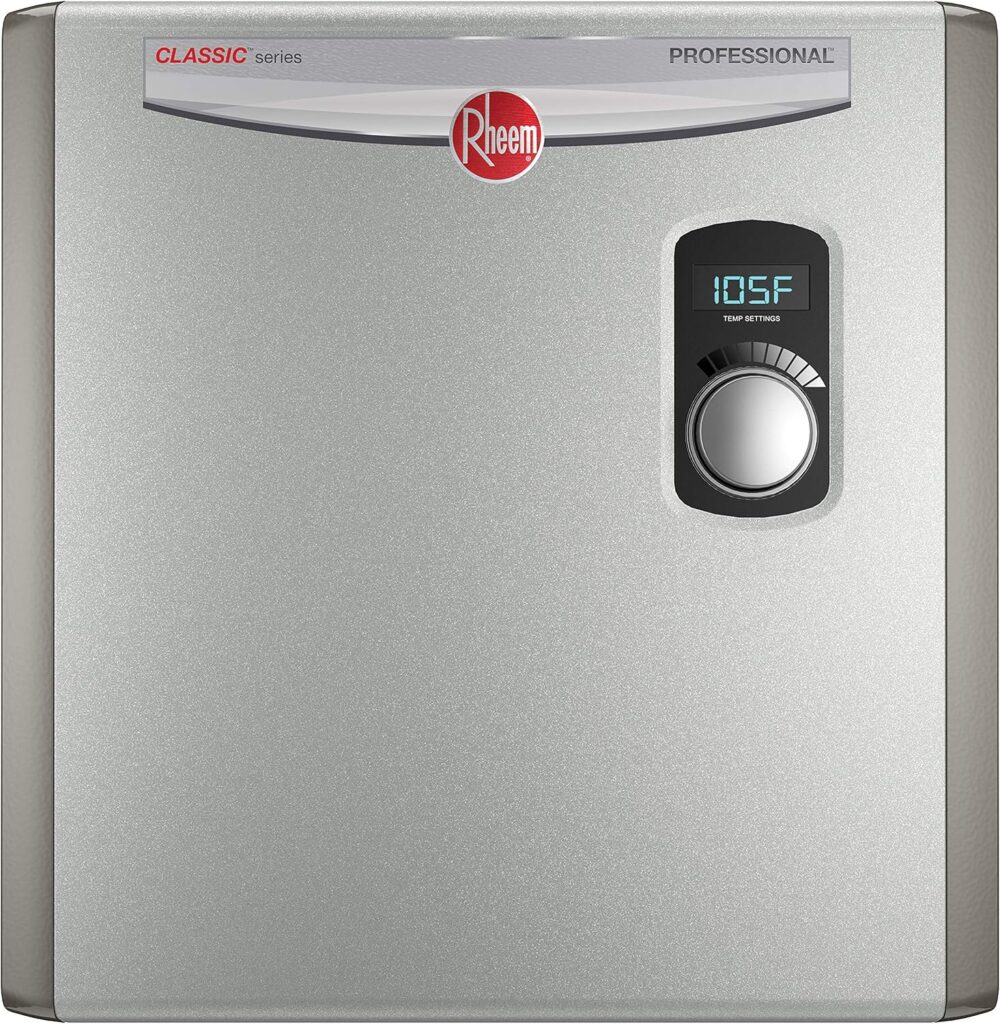
3. Rheem RTEX-24 Electric Tankless Water Heater
Why It’s Great: This Rheem model is a solid mid-range option with a great balance of affordability, efficiency, and ease of use, perfect for smaller homes.
- Flow Rate: 5.9 GPM
- Power Output: 24 kW
- Key Features:
- External adjustable digital thermostatic control
- Durable copper immersion heating elements
- Easy to service
- Pros:
- Simple installation
- Adjustable temperature control
- Cons:
- Not ideal for large households
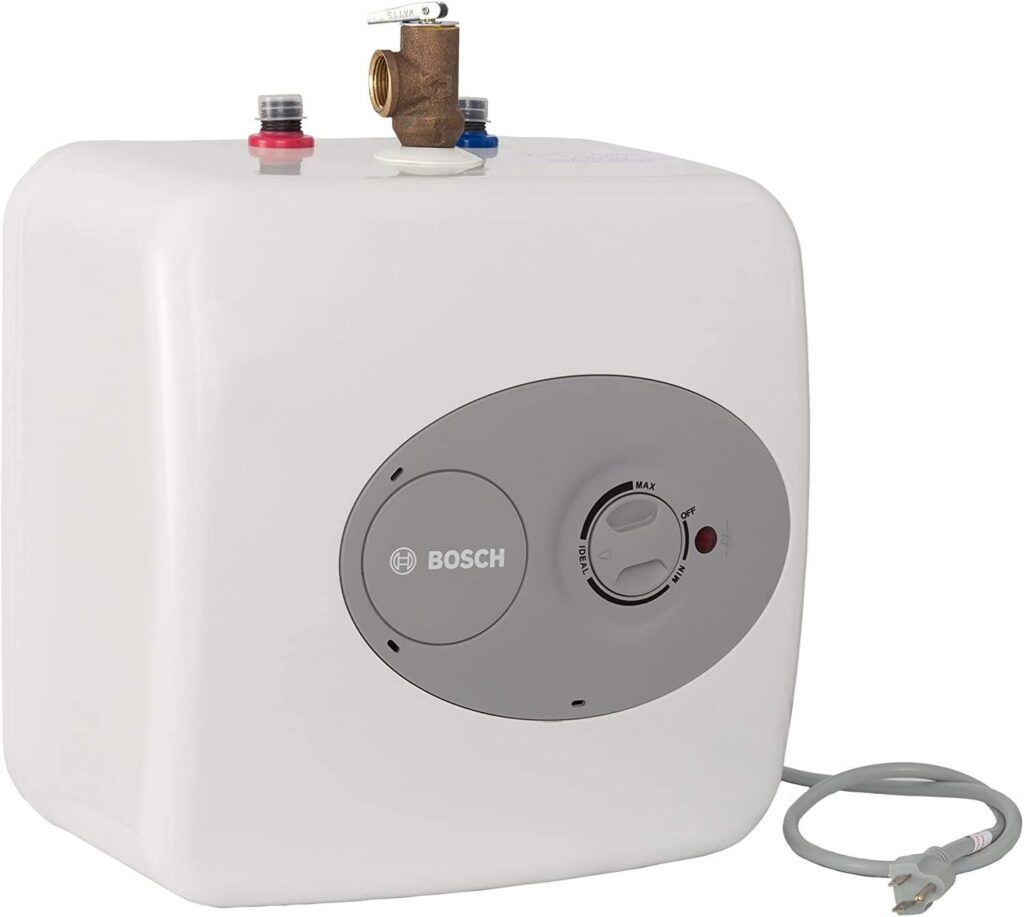
4. Bosch Tronic 3000 T Electric Mini-Tank Water Heater
Why It’s Great: The Bosch Tronic 3000 T is a great option for point-of-use applications where you need hot water instantly, such as in kitchens or bathrooms.
- Flow Rate: 2.5 GPM
- Power Output: 12 kW
- Key Features:
- Mini-tank design for instant hot water
- Easily fits under sinks
- Fast recovery rate
- Pros:
- Ideal for point-of-use applications
- Saves space
- Cons:
- Limited flow rate
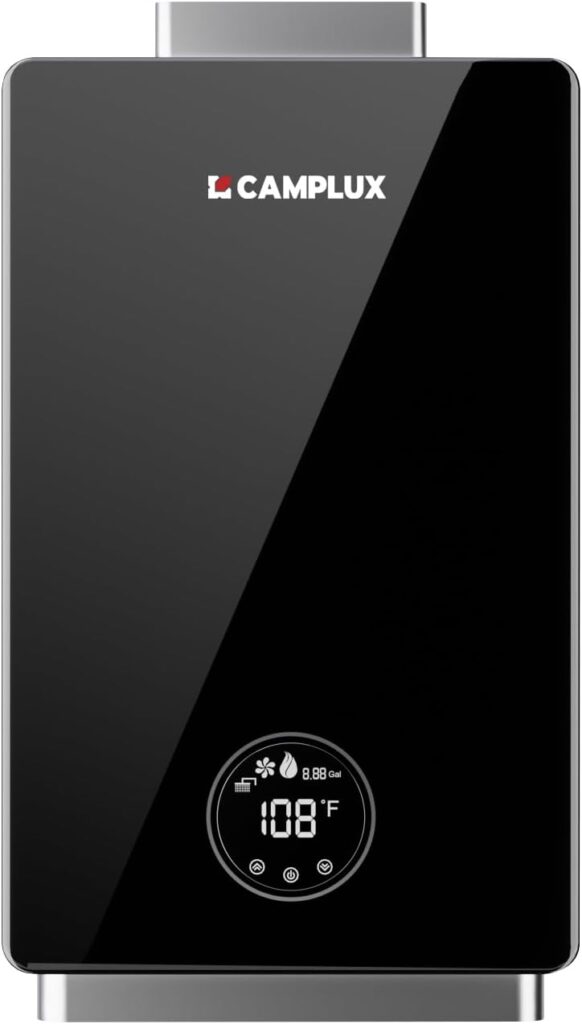
5. Camplux Electric Tankless Water Heater
Why It’s Great: This is an affordable option for those looking to enjoy the benefits of a tankless electric water heater without breaking the bank.
- Flow Rate: 3.18 GPM
- Power Output: 18 kW
- Key Features:
- High efficiency with low energy consumption
- Lightweight and compact
- Overheat protection system
- Pros:
- Budget-friendly
- Quick heating capability
- Cons:
- Not ideal for simultaneous large loads
Installation and Maintenance Tips for Tankless Electric Water Heaters
1. Professional Installation: It’s recommended to have a professional handle the installation of your tankless water heater, especially if your home needs additional electrical wiring or adjustments to accommodate the unit’s power demands.
2. Regular Maintenance: To keep your heater running smoothly, consider flushing the system annually to remove any mineral buildup, especially if you live in an area with hard water.
3. Monitor Energy Usage: Regularly check your water heater’s energy consumption to ensure it’s running efficiently. Many models offer digital displays to help monitor performance and detect potential issues early on.
Final Thoughts: Is a Tankless Electric Water Heater Right for You?
Choosing a tankless electric water heater can significantly reduce your energy costs, provide unlimited hot water, and save space in your home. Whether you’re looking for a high-performance unit for a large household or a compact option for smaller spaces, there are plenty of options available to suit your needs.
By considering your household’s water usage, the unit’s flow rate, power output, and installation requirements, you can find the perfect water heater to enjoy reliable, energy-efficient hot water for years to come.
Affiliate Disclosure: Some of the links in this post are affiliate links. If you click on them and make a buy, I earn a small commission at no extra cost to you. I only recommend products I personally believe in for their quality and authenticity.
